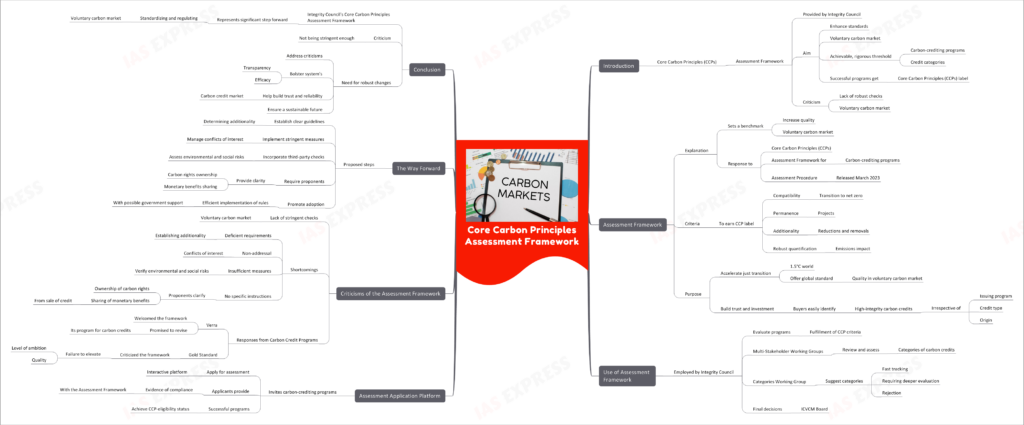Core Carbon Principles Assessment Framework- Highlights, Purpose & Criticism

The Core Carbon Principles Assessment Framework was recently introduced by the Integrity Council. The framework is intended to bolster standards in the voluntary carbon market by providing an achievable yet rigorous threshold for assessing carbon-crediting programs and credit categories. Successful programs can subsequently bear the Core Carbon Principles (CCPs) label. However, despite its noble intentions, the framework has received criticism for not providing robust enough checks on the voluntary carbon market.

This topic of “Core Carbon Principles Assessment Framework- Highlights, Purpose & Criticism” is important from the perspective of the UPSC IAS Examination, which falls under General Studies Portion.
The Assessment Framework
What is it?
The Assessment Framework sets a benchmark to increase the quality across the voluntary carbon market. This comes in response to the Core Carbon Principles (CCPs), Assessment Framework for carbon-crediting programs, and Assessment Procedure released in March 2023.
The Criteria
The framework outlines specific criteria that must be met by carbon-crediting programs and credit categories to earn the CCP label. These include:
- Compatibility with a transition to net zero
- Permanence of projects
- Additionality of reductions and removals
- Robust quantification of emissions impact
Purpose
The Framework’s primary goal is to accelerate a just transition to a 1.5°C world by offering a global standard for quality in the voluntary carbon market. This helps build trust and investment by allowing buyers to easily identify high-integrity carbon credits, irrespective of the issuing program, credit type, or origin.
The Use of Assessment Framework
The Integrity Council employs the Assessment Framework to evaluate if programs fulfill the CCP criteria. Multi-Stakeholder Working Groups and a Categories Working Group are established to review and assess categories of carbon credits. These groups are expected to suggest categories for fast tracking, requiring deeper evaluation, or rejection. The final decisions rest with the ICVCM Board.
Assessment Application Platform
The Integrity Council invites carbon-crediting programs to apply for assessment via an interactive platform. Applicants are to provide evidence supporting their compliance with the Assessment Framework. The successful programs then achieve CCP-eligibility status.
Criticisms of the Assessment Framework
Despite being released with great anticipation, the Assessment Framework has been criticized for not enforcing stringent checks on the voluntary carbon market.
Shortcomings
Some areas where the framework fails to enforce robust requirements include:
- Deficient requirements for establishing additionality
- Non-addressal of conflicts of interest
- Insufficient measures to verify environmental and social risks
- No specific instructions for proponents to clarify ownership of carbon rights and the sharing of monetary benefits from the sale of credit
Responses from Carbon Credit Programs
While Verra welcomed the framework and promised to revise its program for carbon credits, Gold Standard criticized the framework for failing to elevate the level of ambition or quality.
The Way Forward
To remedy the existing gaps in the Assessment Framework, the following steps are proposed:
- Establish clear guidelines for determining additionality
- Implement stringent measures to manage conflicts of interest
- Incorporate third-party checks to assess environmental and social risks
- Require proponents to provide clarity on carbon rights ownership and monetary benefits sharing
- Promote the adoption and efficient implementation of rules with possible government support
Conclusion
The Integrity Council’s Core Carbon Principles Assessment Framework represents a significant step forward in standardizing and regulating the voluntary carbon market. However, the framework has faced criticism for not being stringent enough. For the framework to be more impactful, these criticisms should be addressed, necessitating robust changes to bolster the system’s transparency and efficacy. This will help build trust and reliability in the carbon credit market, ensuring a sustainable future.
Practice Question for Mains
What is the Core Carbon Principles Assessment Framework recently introduced by the Integrity Council? How could this framework be implemented effectively? (250 words)

